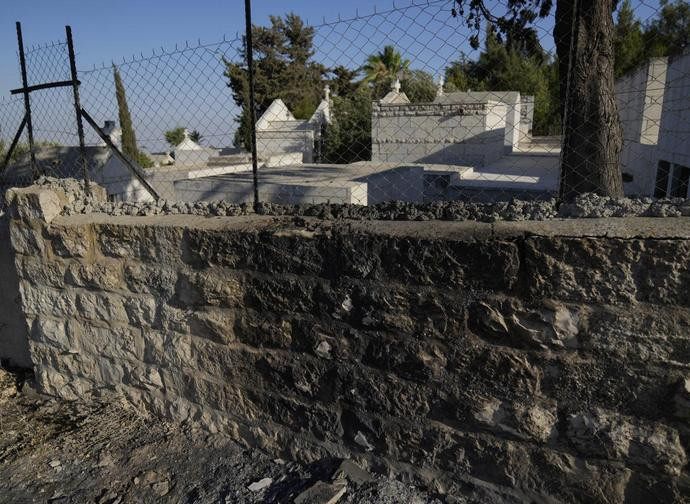Holy Land: Israeli settlers attack Christian villages
Christians in Taybeh, an ancient village in Ephraim in the West Bank, appeal for help against the continuous attacks by Jewish settlers aiming to take their homes and land. And Netanyahu’s government is complicit. The solidarity visit of the leaders of the Christian Churches.

They no longer respect any law. Except their own dictates. They are a threat not only to Christians and Muslims but also to the security of the Israeli people. The former head of Shin Bet, Ronen Bar, recently wrote this in a letter to Prime Minister Benjamin Netanyahu. Bar does not mince words, speaking of "Jewish terrorism." "They are endangering the security of the state after being provided substantial funding, political legitimacy, and, above all, weapons legally distributed by the state," Bar said. The ultra-Orthodox settlers are under accusation. They are heavily criticized for ignoring all laws and raiding the occupied territories of the West Bank on a daily basis, sowing terror and destruction.
On August 15, 2023, almost a year ago, a group of over 100 armed settlers stormed the Palestinian village of Jit in the Nablus area. They set fire to homes and cars. Not satisfied, they also killed a 23-year-old man. According to the report delivered to government authorities, both the army and the police had been informed by the secret services of the planning of this act of “nationalist violence.” However, neither the army nor the police did anything to stop the attack.
Recently, the settlers have escalated their attacks, targeting Christian villages. They want to take over the land and homes of the Christians and are using every strategy available to force them out. They act with impunity because they know no sanctions will ever be imposed on them.
One example is the village of Taybeh, also known as ancient Ephraim, where Jesus stayed with his disciples before his Passion. It is located about thirty kilometers from Jerusalem. The strategy is well established: the settlers arrive in groups armed with weapons and clubs. First, they set fire to dry grass to start a blaze; then, they set fire to houses. During the recent arson, the priests of the three parishes—Latin, Melkite, and Orthodox—called the police emergency number twice. They were told that the police would arrive, but no officers or soldiers ever showed up.
This is the second time since July that these far-right extremists have attacked the village. In the most recent attack on July 7, they set fire to a fifth-century building near the local cemetery and the Church of St. George (see the LaPresse photo). Not satisfied, they left signs saying, "There is no future for you in this land. Go away, go away!" An invitation for the population to abandon their homes and emigrate. But it is nothing new; the population has been fleeing Taybeh for seventy years. There used to be 15,000 people in Taybeh; now, there are just 1,300. Some have left for Paris, some for Australia, and some for Mexico and other countries, just to escape the harassment of the Jews.
But why do they continue to force us to leave this land? The Christians of Taybeh ask themselves. "Christianity has been present in this place for over two thousand years," the leaders of the Christian churches emphasized when they visited the village on July 14 in solidarity with their fellow believers. "We firmly reject this message of exclusion and reaffirm our commitment to a Holy Land where different faiths live together peacefully, with dignity and security."
Meanwhile the settlers' raids go unreported with the complicity of politicians and the government. Most of all, there is the deafening silence of Prime Minister Netanyahu. So, the Christians of Taybeh are appealing to world public opinion. They simply ask to live in peace, a right they have held for two thousand years. They want to be able to travel to Ramallah or Jerusalem in a reasonable amount of time without facing harassment from soldiers at checkpoints who try to prevent them from going to work.
Before October 7, 2023, many Palestinians used to work in Israel. Since then they have been replaced by Indian workers. Hamas's cowardly attack has led to a general and radical loss of trust in Palestinians, even among the most open and liberal Israelis. "Let us not forget to pray for peace and for all those who, because of violence and war, find themselves in a state of suffering and need," said Pope Leo XIV during last Sunday's Angelus at Castel Gandolfo. "Many people are stripped, robbed, and plundered. They are victims of oppressive political systems and an economy that forces them into poverty. War kills their dreams and their lives."
Mutual hatred, resentment, and contempt are increasingly widespread among Palestinians and Israelis. However, justice must take its course and call to account those who have caused this destruction.
There are over thirty parishes of the Latin Patriarchate of Jerusalem in the West Bank. Every day, priests call Patriarch Pizzaballa to report increasingly aggressive raids and attacks by settlers who loot and destroy everything in their path. In this scenario, the Christians of Taybeh feel powerless and lost. They do not know who to turn to or who to ask for justice. The Palestinian Authority is weak and ineffective, and the Israelis do not intervene, ignoring what is happening. In fact, soldiers sometimes escort the settlers during their raids.
What future awaits the Palestinians? People are calling for peace. But what kind of peace? It certainly won't result from signing an agreement. It will require social reconstruction at cultural, educational, economic, and political levels. It is a language that must be purged of hatred and contempt.
